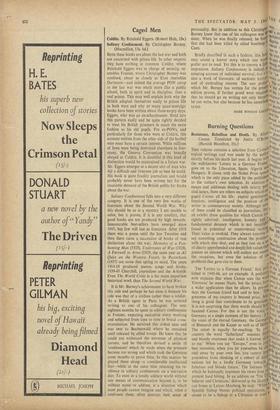Caged Men BOTH these books are about the last war
and both arc concerned with prison life. In other respects they have nothing in common. Colditz„ where Reinhold Eggers was in charge of security, re- sembles Fresnes, where Christopher Burney was confined, about as closely as Eton resembles Dartmoor—and indeed the average POW camp in the last war was much more like a public school, both in spirit and in discipline, than a real prison. This may well explain both why the British adapted themselves easily to prison life in both wars and why so many quasi-nostalgic books have been written about those empty days. Eggers, who was an ex-schoolmaster, fitted into this pattern easily and he quite rightly decided to treat his British prisoners in much the same fashion as his old pupils. For ex-POWs, and particularly for those who were at Colditz, this account written from the other side of the barbed wire must have a certain interest. While millions of Jews were being destroyed elsewhere in Ger- many, the Geneva Convention was broadly obeyed at Colditz. It is doubtful if this kind of distinction would be maintained in a future war. Mr. Eggers emerges as a decent sort of man who did a difficult and tiresome job as best he could. His book is quite frankly journalism and would probably never have been written but for the insatiable demand of the British public for books about the war.
Solitary Confinement falls into a very different category. It is one of the very few works of literature about the Second World War. Why this should be so is a mystery I am unable to solve, but it proves, if it is any comfort, that good books are not produced by high rewards. Innumerable best-sellers have emerged since 1945. but few will last as literature. After 1918 there was a pause until the late Twenties and then there came a succession of books of real distinction about the war; Memoirs of a Fox- hunting Man (1928), Undertones of War (1928), A Farewell to Arms (1929, the same year as All Quiet on the Western Front), In Parenthesis (1937) are some that spring to mind. The years 1914-18 produced poems, songs and books, 1939-45 Churchill, journalism and the A-bomb. Even The World Crisis is a far more important historical work than The Second World War.
It is Mr. Burney's achievement to have broken this rule and perhaps he has done it because his role was that of a civilian rather than a soldier. As a British agent in Paris he was arrested writing to one of his colleagues. The next eighteen months he spent in solitary confinement at Fresnes, expecting execution every morning and subjected from time to time to brutal cross- examination. He survived this ordeal sane and was sent to Buchenwald where he remained until released by allied troops. He knew that he could not withstand the extremes of physical torture. and he therefore devised a series of 'confessions' which he made when the pressure became too strong and which took the Germans some months to prove false. In this manner he played them along---a considerable intellectual feat—while at the same time retaining his re- silience in solitary confinement on a starvation diet; To exist in a totally solitary world without any means of communication beyond it, to be without name or address, is a situation which most people cannot imagine and which, when a confronts them, often destroys their sense of sister. When he was finally released, he foot,' personality. But in addition to this Christoph..el,411114fil. • Burney knew that one of his colleagues was n°, 'Ix a dc that she had been killed by allied bombing eria, Caen. Ngeed t, may sound a horror story which one won't he sees t prefer not to read. Yet this is to convey a f314 ci Briefly described in such a fashion, this bolt has cost impression. Solitary Confinement is indeed ,ut simpi , amazing account of individual survival, but it air 'an also a work of literature, of sardonic hunica lilents and of enthralling interest. The new pref0:0 The e, which Mr. Burney has written for the preseT °1 the n edition proves, if further proof were required' the c that he should go on writing not only because reviewer he can write, but also because he has somethia some ht.
MARK DONFIAM CARTO Nlence






































 Previous page
Previous page